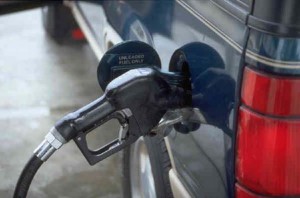Is the tank half empty or half full? The good news is that the U.S. job market is showing strong signs of recovery. The bad news is that American motorists will be paying more for gas as a result.
The prospects of a strong U.S. economy leading to increased demand for oil is only complicating the impact of the crisis in Libya, helping drive petroleum prices to around $108 a barrel on the New York Mercantile Exchange, this morning. Traders saw prices for low-sulfur Ice Brent Cruise near the $120 mark, both 30-month highs.
For motorists, that’s translating into pain at the pump, much of the country now paying more than at any time since September 2008. And with spring finally reaching much of the U.S., the figures could continue climbing.
The national average for a gallon of regular unleaded paid for in cash is now $3.64, according to the AAA. That’s up 7 cents in just a week. But some markets have seen significantly bigger increases. The AAA Michigan reports fuel costs rose 15 cents over the last week, to $3.75 a gallon.
The latest spike followed a federal government report that 216,000 new jobs were created in March, driving the U.S. unemployment rate down to 8.8%. Traders are betting that will mean more commuting and more discretional spending, including increases in travel.
But the bigger factor remains the crisis in Libya, warned analysts with Germany’s Commerzbank. “As long as the fighting for major Libyan oil towns Ras Lanuf and Brega continues, a resumption of oil shipments is unthinkable,” warned a new report from the bank.
While Libya provides an insignificant portion of American oil supplies petroleum is priced on a global basis the shortfall is impacting what motorists bay everywhere from Beijing to Berlin to Bangor, Maine.
On the other hand, it appears other oil producers may be taking steps to offset the Libyan crisis, noted Austrian-based JBC Energy. “Libyan production declined by just over 1 million barrels a day in March, but total OPEC production fell by only 500,000 barrels a day as other OPEC members – mainly Saudi Arabia, the United Arab Emirates and Kuwait – picked up the slack.”
Not everyone is convinced the recent run-up in fuel prices is legitimate. West Virginia Senator Jay Rockefeller wants the Federal Trade Commission to investigate and, if necessary, takes steps “reducing the risk of fraud or deceit in the petroleum market.”

